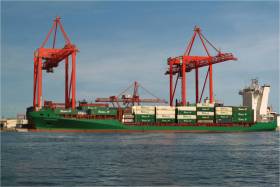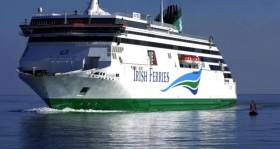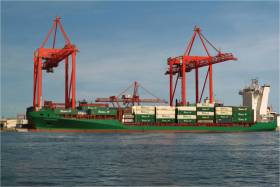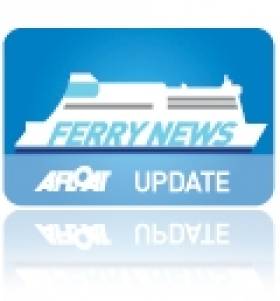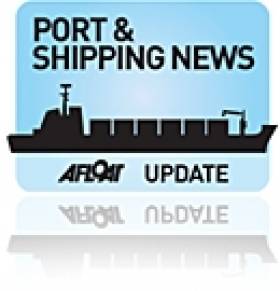Displaying items by tag: ICG Group
Irish Continental Group (ICG) Chief Paid €2.9m as Ferry Group Defends Chair’s 19-year Tenure
The pay package of Irish Continental Group’s chief executive, Eamonn Rothwell has jumped almost 250 per cent to €2.9 million last year, as the parent company of Irish Ferries, operating Ireland-UK routes and between Ireland and France, returned to profit after the pandemic.
In addition to Irish Ferries running its fledgling UK-France service on the Dover-Calais route that was launched in June, 2021 in the wake of Brexit, which has expanded into a three-ship service (see related story).
Last year, Mr Rothwell also collected €4.28 million of dividends on his 17.7 per cent stake as the Dublin based company, had handed out €24.2 million of such payments to shareholders, including an interim dividend for 2022.
According to ICG’s annual report, released on Tuesday, showed Mr Rothwell received a 20 per cent rise in basic pay last year – to €700,000. In addition the Chief Executive secured a €1.38 million bonus by way of restricted shares, which have a five-year disposal restriction.
As for share options, they were awarded under a performance share plan that was valued at €814,000, while other benefits amounted to €35,000.
The company which has its head office located in Dublin Port, earlier this month reported an operating profit of €66.7 million for 2022, a year in which revenues soared almost 75 per cent compared to pandemic-stricken 2021.
As The Irish Times (which has more) reports on the company that made losses at both operating and net earnings level in 2020 and 2021.
Whereas revenues at the maritime transport group had increased by €250.4 million to last year’s €584.9 million.
To consult the annual report in full, click this link.
Ferry Operator ICG Revenue Up As Traffic Increases
#FerryNews -Consolidated revenue at Irish Continental Group (ICG) operator of Irish Ferries, increased by 3.1pc to €288.9m year-on-year in the ten months to 31 October.
Total revenues writes The Independent for the group’s ferries division was €184.4m, a 1.4pc increase on the prior year. The increase in revenue was driven by an increase in the number of cars and container freight that ICG carried.
For the year to 11 November, Irish Ferries carried 385,100 cars, an increase of 2.2pc on the previous year. Freight carryings for the year to 11 November were 247,700 roll-on roll-off, an increase of 0.5pc compared with 2016.
Despite the weakness in sterling, ICG managed to partly mitigate revenues affected by sterling with improvements in its sterling-based costs. However the company said that fuel costs continued to be impacted by higher global fuel prices compared to this time last year.
Total revenues recorded in the group’s container and terminal division recorded in the period to 31 October amounted to €111.2m, a 5.9pc increase on the prior year. For the year to 11 November container freight volumes shipped were up 5.5pc on the previous year at 281,000 teu, with the rate of growth slowing to 3.8pc in the period since 30 June.
Units handled at the group’s terminals in Dublin and Belfast increased 3.2pc year on year to 258,400 lifts. For more on the maritime transport logistics operator, click here.
ICG Revenue In Container & Terminal Division Rise 5.7% On Previous Year
#LoLoTrade - Irish Continental Group (ICG) total revenue in Container (Lo-Lo) and Terminal Division recorded in the period 1 January to 31 October 2016 amounted to €105.0 million, an increase of 5.7% on the previous year.
For the year to 5 November container freight volumes shipped were up 5.3% on the previous year at 260,900*TEU , with the rate of growth slowing to 2.5% in the period since 30 June reflecting market trends.
Units handled at our terminals in Dublin and Belfast increased 18.8% year on year to 245,300 lifts, principally attributable to increased throughput at the Belfast terminal in the first half of the year. This reflects the award of the concession to operate the larger combined container terminal at the Belfast Victoria Terminal 3 which commenced in June of the prior year. In the period since 30 June with comparable operations the terminal throughput was 2.2% lower reflecting changes in customer schedules.
The effect of a weaker Sterling is not significant in the Container and Terminal Division due to the low level of net Sterling exposure.
*TEU twenty foot equivalent container units
ICG Container and Terminal Divisions Half Year Results
#Containers - Irish Continental Group (ICG) container subsidiary Eucon and divisions operating terminals in Dublin and Belfast ports, have released half-year results for 2016.
Revenue in the division was up 9.8% to €62.8 million (2015: €57.2 million), EBITDA increased to €6.6 million (2015: €5.5 million) while EBIT rose to €5.4 million (2015: €4.1 million).
Total containers shipped were up 7.4% at 152,700 teu (2015: 142,200 teu).
Containers handled at the Group's terminals in Dublin Ferryport Terminals (DFT) and Belfast Container Terminal (BCT) were up 39.6% to 144,800 lifts (2015: 103,700 lifts). DFT's volumes were up 5.0%, while BCT's lifts were up 149.3%.
The increase in Belfast arises from the commencement in June 2015 of the Services Concession to BCT for the operation of a combined container terminal at Victoria Terminal 3 (VT3).
Containership, MV Ranger remains on time charter to a third party and is currently trading in north-west Europe while MV's Elbtrader, Elbcarrier and Elbfeeder remain on time charter to Eucon.
ICG Sees Bookings in Tourism Recover after Brexit Wobble
#HalfYearResults - Container and ferry operator, Irish Continental Group said the Brexit vote “shock” had a brief impact on tourism bookings. But they have since recovered as the ferry operator reported a 19.6 per cent increase in earnings for the first half, writes The Irish Times.
Earnings before interest, tax, depreciation and amortisation (ebitda) rose to €30.5 million from €25.5 million for the same period last year. Cars carried on its division, Irish Ferries increased 5.5 per cent and roll-on, roll-off (RoRo) freight volumes gained 5.6 per cent.
Container (LoLo) volumes shipped during the period rose by 7.4 per cent, it said.
The result of the June Brexit referendum “had an initial negative impact on UK consumer demand”, said ICG. “The demand situation seems to have settled now as the initial shock of the referendum result has waned, although the negative sterling impact on yields remains.”
ICG said the outlook for the remainder of the year “is for a continuation of the overall business momentum seen to date, with some easing in our tourism revenues, growth in our RoRo and LoLo (lift-on, lift-off) revenue, and increased contribution” from chartering ships to third parties.
Total revenues rose by 5.2 per cent on the year to €150 million, while basic earnings per share increased 32 per cent to 10.3 cents. ICG will pay out a 3.82 cent dividend for the first half, up 5 per cent on its last interim dividend.
For more on the half-year results, click here.
#Q1figures2016 - Irish Continental Group (ICG) parent company of Irish Ferries, today has issued their Interim Management Statement which covers carryings and financial information for the first quarter of 2016, i.e. 1 January to 30 April with comparisons against the corresponding period in 2015. All figures are unaudited.
Consolidated Group revenue in the period was €91.4 million, an increase of 7.4% compared with last year. Net debt at the end of April was €25.9 million compared with €44.3 million at 31 December 2015.
There has been a good start to the year with trading conditions remaining favourable.
Ferries Division
Total revenues recorded in the period amounted to €51.6 million (including intra-division charter income), a 7.1% increase on the prior year.
In this seasonally less significant period for tourism, Irish Ferries carried 90,200 cars, an increase of 5% on the previous year, while freight carryings were 92,300 RoRo units, an increase of 8% compared with 2015.
The ropax ferry MV Kaitaki remained on charter, operating in New Zealand, while the four container ships acquired in late 2015 were fully deployed in the period.
Delivery of the recently acquired vessel "Westpac Express" is expected by late May. It is bareboat chartered to a third party for a firm period of four months with four further one year option periods and a final seven month option at the Charterer's option.
Container and Terminal Division
Total revenues recorded in the period amounted to €42.3 million, a 13.4% increase on the prior year.
Container freight volumes shipped were up 10% on the previous year at 103,400 teu (twenty foot equivalent units), while units handled at our terminals in Dublin and Belfast increased 54% year on year to 96,500 lifts.
Dublin Ferryport Terminals (DFT) throughput increased by 8% on the prior year.
Throughput at Belfast Container Terminals (BCT) increased by 257% reflecting the additional volumes following the award of the concession to operate the larger container terminal at Victoria Terminal 3 (VT3) which commenced in June of the prior year.
Irish Continental Group's Q3 Interim Managment Statement
#ICGinterimStatement - The Irish Continental Group (ICG), parent company of Irish Ferries released today it's Interim Management Statement for Q3, the three months up to the end of September, 2015.
Current trading
In the seasonally most significant quarter of the year, the three months to 30 September, the Group's revenue rose 10.4% to €105.5 million (2014: €95.6 million) while EBITDA rose to €38.6 million, compared with €28.4 million in the same quarter in 2014. Operating profit in the quarter was €34.2 million versus €24.0 million in the same period in 2014.
Summer trading has been strong with volume and revenue growth across the Group's two operating segments; Ferries and Container & Terminal. Group fuel costs in the quarter were €10.3 million (2014: €14.8 million) reflecting lower commodity prices partially offset by a stronger dollar and the amendment of marine environmental regulations requiring the Group to consume more expensive fuel grades.
Volumes 1 July - 7 November
In the period from 1 July 2015 to 7 November 2015 total passengers carried increased by 3%, while cars carried increased by 5%. In the RoRo freight market, Irish Ferries volumes were up 8% in the period.
Container freight volumes for the same period were up 7%. Units lifted at our container ports at Dublin and Belfast were up 51%, with underlying port lifts up 5% after adjusting for Belfast VT3 concession volumes in 2015.
Year to Date Volumes
Cumulatively, in the year to 7 November 2015, total passengers carried were up 3% at 1,530,100, while cars carried were up 6% at 362,900. RoRo freight volumes in the same period were up 10% on last year at 231,500 units.
Container freight volumes were up 3% at 247,500 teu. Units lifted at our container ports rose by 29% to 207,900 lifts, with underlying port lifts up 5% after adjusting for Belfast VT3 concession volumes in 2015.
Cumulative Financial Results to 30 September (unaudited)
Group revenue for the nine months to 30 September 2015 was €248.6 million (2014: €226.3 million), up 9.9%. Revenue in the Ferries division was up 10.8% compared with the comparable period in 2014, while in the Container & Terminal division cumulative revenue was up 8.3% year on year. EBITDA for the nine months was €64.1 million (2014: €42.4 million).
Operating profit for the nine months was €50.6 million compared with €29.2 million in the same period in 2014. Net debt at the end of September was €20.4 million compared with €33.7 million at 30 June 2015. Subsequent to the quarter end the interim dividend of €6.8 million was paid.
Other Developments
Following the award of the Services Concession for the operation of a combined container terminal at Victoria Terminal in Belfast Harbour, the consolidation of our existing container volumes at Belfast has been completed. Progress on developing volumes through Belfast and harnessing the efficiencies of a single terminal are continuing.
As previously reported Afloat, the Group has concluded agreements (on 27 October) for the acquisition of four container vessels at a total cost of €24.2 million, with delivery expected to complete during December. These vessels will be offered to the market on a charter basis.
Irish Continental Group Acquires Containerships for €24.2 million
#ICGacquireLoLos – The Irish Continental Group (ICG) has entered into agreements for the purchase of four lo-lo container vessels for a total consideration of €24.2 million.
The following three vessels of the quartet are the MV Elbfeeder (built 2008), MV Elbtrader (built 2008) and MV Elbcarrier (built 2007). They each which has a capacity for 980TEU (twenty foot equivalent) and a gross tonnage of 8,246 tons.
This trio of vessels, Afloat understands are currently in operation on the group’s container shipping division EUCON which has more containerships in service on routes between Belfast, Dublin, Cork and Rotterdam and Antwerp.
In addition is the fourth vessel in the acquisition deal, the MV Jork Ranger (built 2005) which has a capacity for 803TEU and a gross tonnage of 7,852 tons.
The MV Elbfeeder will be purchased from MS "Elbfeeder" UG (haftungsbeschrankt) & Co. KG . The MV Elbtrader will be purchased from MS "Elbtrader"GmbH & Co .KG. The MV Elbcarrier will be purchased from MS "Elbcarrier" UG (haftungsbeschrankt) & Co KG. The MV Jork Ranger has been purchased from MS "Jork Ranger" Bernd Becker GmbH & Co KG.
Under the terms of the purchase agreements title to the MV Elbfeeder, MV Elbtrader and MV Elbcarrier will transfer to ICG on delivery of those vessels which is expected in December.
Title to the MV Jork Ranger was transferred to ICG on delivery of that vessel. The purchase consideration is payable in cash on completion. The vessels will be offered to the market on a charter basis.
#ICGinterimStatement – Shipping, transport and leisure operator, Irish Continental Group (ICG) has issued this interim management statement which covers carryings from 1 January to 9 May 2015 and financial information for the first four months of the year, i.e. 1 January to 30 April.
It should be noted that ICG's business is significantly weighted towards the second half of the year when normally a higher proportion of the Group's operating profit is generated than in the first six months.
In the period to 9 May 2015, Irish Ferries carried 94,800 cars, an increase of 8% on the previous year. Total passenger volumes increased by 3% compared to the previous year to 418,600.
In the Roll on Roll off freight market, Irish Ferries carried 91,800 units, an increase of 11% compared with the same period in 2014.
Container freight volumes shipped were down 1% on the previous year at 100,000 teu (twenty foot equivalent units), while units handled at our terminals in Dublin and Belfast increased 3% year on year, over the same period to 67,400 lifts.
In the first four months of the year, Group revenue rose 7.3% to €85.1 million, compared with €79.3 million in the same period last year. Operating costs (before depreciation & amortisation) were 1.6% lower at €74.8 million, versus €76.0 million the previous year, mainly reflecting the lower cost of fuel. Earnings before interest, tax, depreciation and amortisation (EBITDA) was €10.3 million compared with €3.3 million in the same period in 2014. The operating profit (before interest) was €4.4 million compared with an operating loss of €2.3 million in 2014. Net debt at the end of April was €45.5 million compared with €61.3 million at 31 December 2014.
Following the completion of an extensive tender process by Belfast Harbour Commissioners, ICG announces that it has been awarded the Services Concession for the operation of a combined container terminal at Victoria Terminal 3 (VT3) in Belfast Harbour. The agreement is for a period of 5 years with a further 3 year option. This will involve the consolidation of the two existing container terminals in Belfast (one of which, BCT, is operated by ICG) into one location at VT3. The process of consolidating the volume of both terminals, which will involve some once off costs, will commence shortly.
Interim Managment Statement
Volumes (Year to date, 9 May 2015)
Change
Passengers: 418,600 +3%
Cars: 94,800 +8%
RoRo Freight: 91,800 +11%
Container Freight: (TEU) 100,000 -1%
Terminal Lifts: 67,400 +3%
Note: The comparative financial information has been restated to the 30 April 2014 which is on the same basis as the current year. In the previous year the financial information disclosed in the interim management statement for the first four months of the year was up to the 26 April 2014.
#ICGresults - The Irish Continental Group (ICG) which operates container operations and Irish Ferries, has recorded higher revenues and operating profits last year, as both passenger numbers and freight volumes increased, reports The Irish Times.
The ferry group, which also owns container shipping line Eucon as well as container terminals in Dublin and Belfast, has also highlighted a positive start to their freight business in 2014, despite the impact of "unprecedented" weather conditions.
Some 16 per cent of budgeted sailings have been cancelled since the start of the year, resulting "in some loss of discretionary passenger business and a disruption to freight business", the group said.
However, additional capacity from its new ferry, the Epsilon, helped counter the effect of the lost sailings, it added.
Passenger numbers have slipped 4 per cent so far in 2014, but roll-on-roll-off freight volumes have surged 18 per cent. For much more on this story click HERE.



























